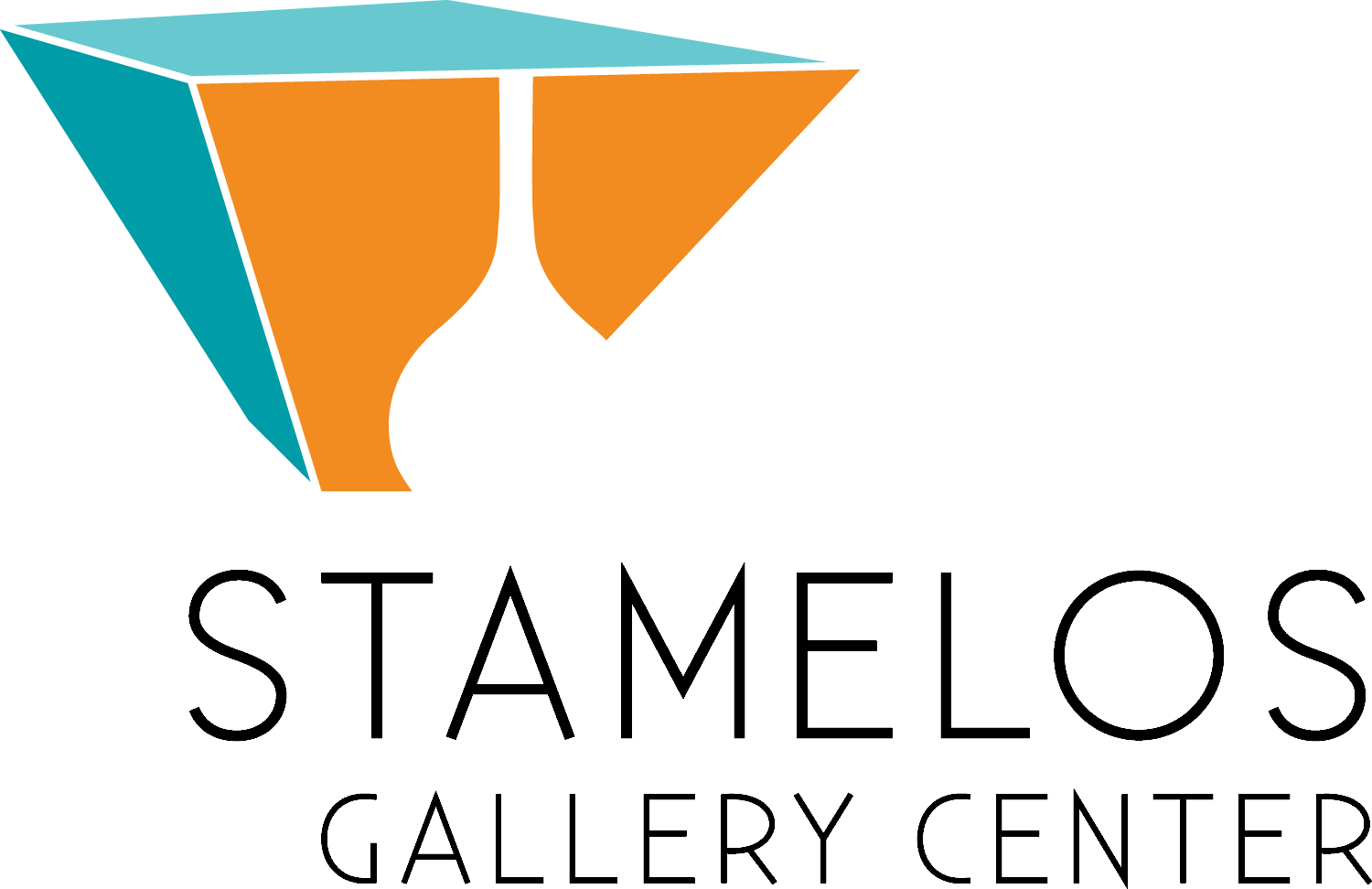

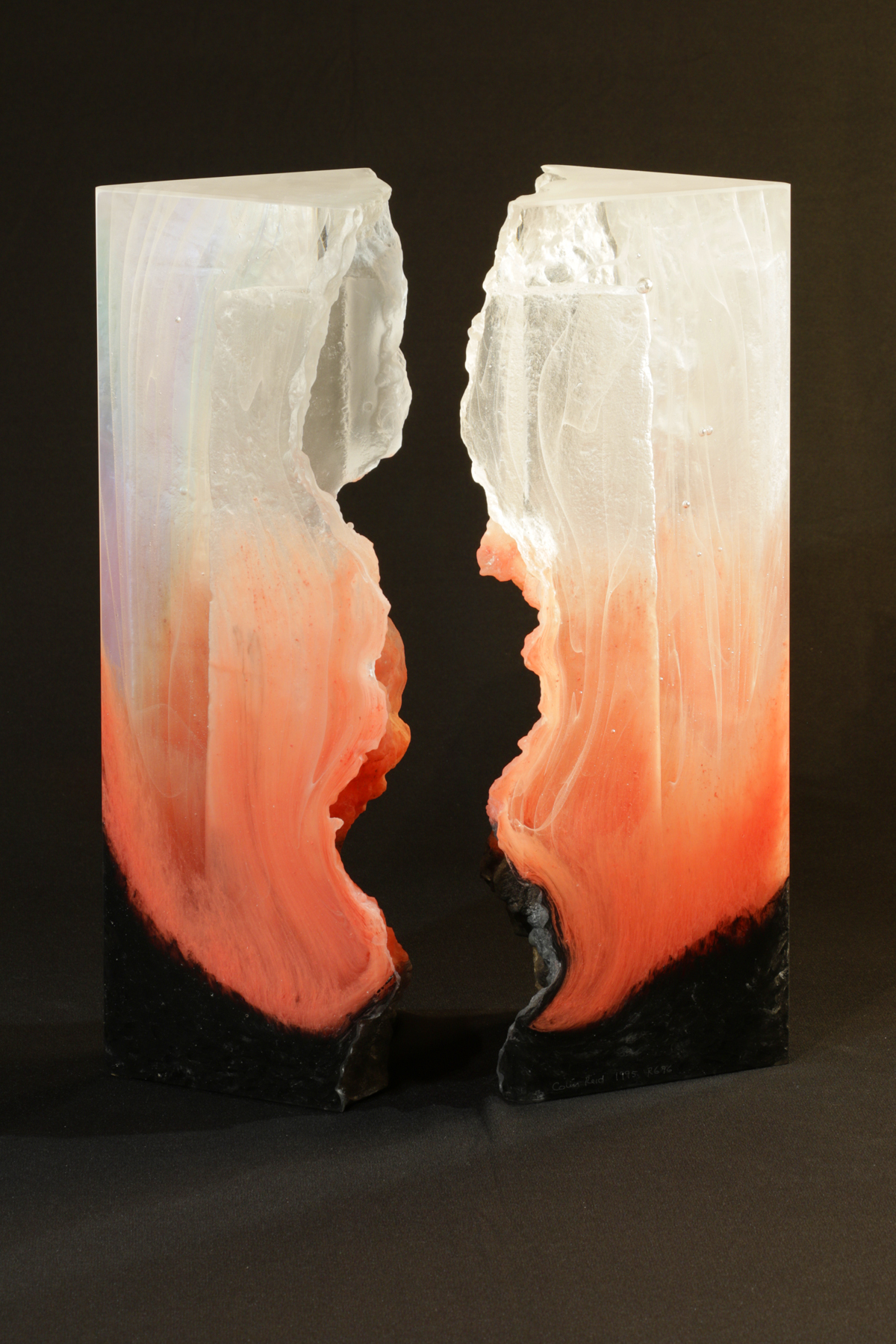
Untitled, Colin Reid, Cast glass, n.d., Gift of Richard and Louise Abrahams, Photograph by Kip Kriigel
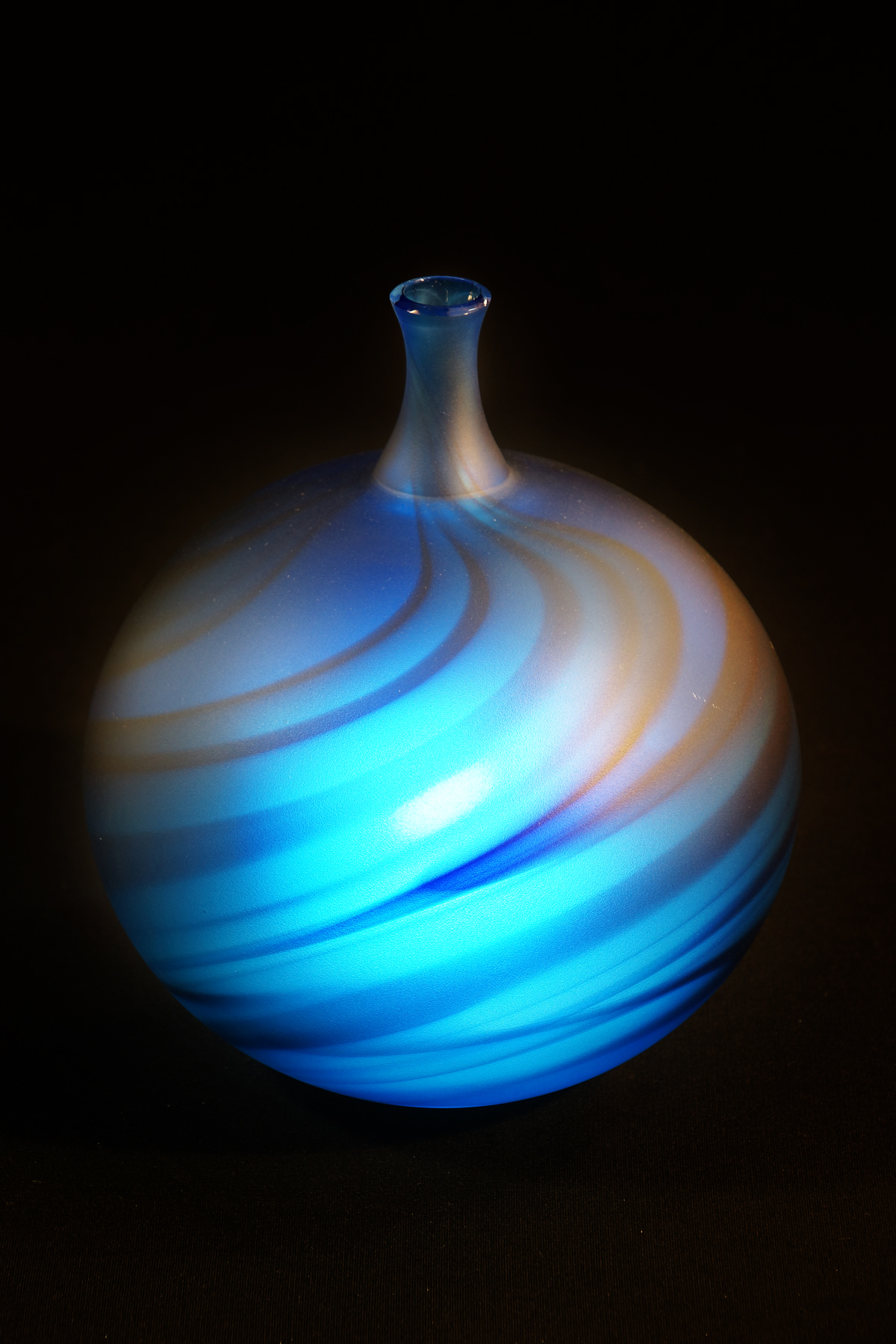
Untitled, Scott Gamble, Glass, n.d., Gift of Richard and Louise Abrahams, Photograph by Kip Kriigel
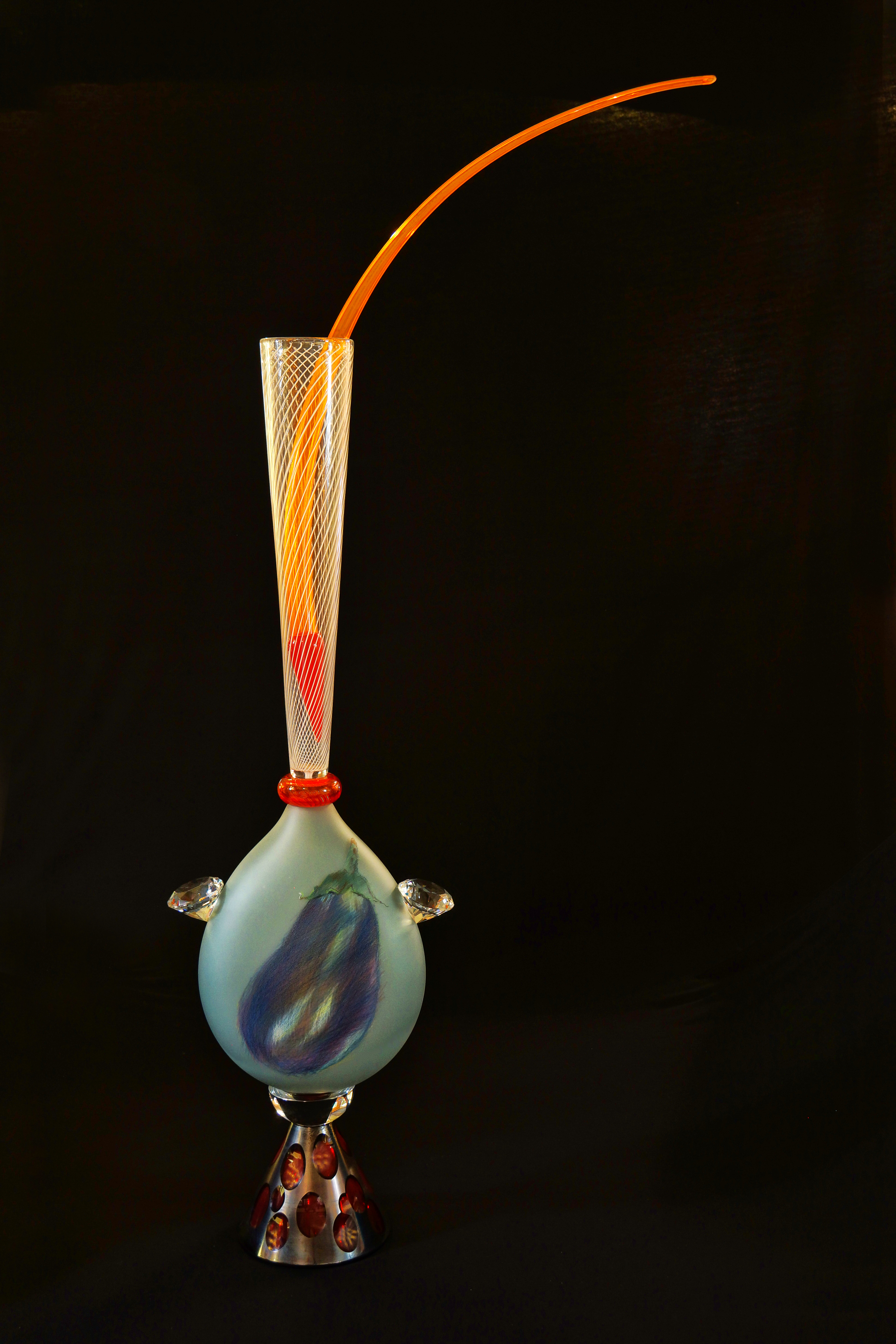
Eggplant Scent Bottle #30200, Nick Mount, Blown glass, n.d., Gift of Richard and Louise Abrahams, Photograph by Kip Kriigel
Glass as a material for contemporary art is like no other. Artists revel in its unique ability to change color and to hold and reflect light. Glass art can be opaque or translucent, solid or hollow, curvy and smooth, simple, solid and geometric, or fragile and decorative. Glass is a medium suited for true artistic experimentation and expression.
The University of Michigan-Dearborn is fortunate to be located within one of the most important regions in the country for glass art. The high concentration of glass studios, galleries, museums, and artists in the area is reflected in the university’s prized permanent glass collection.
The birthplace of the American studio glass movement is located a short distance away in Toledo, Ohio. It all started in 1962 at the Toledo Museum of Art with two glass workshops held and taught by Harvey Littleton and Dominick Labino. These two innovators introduced the first small glass furnace that made it possible for artists to create glass art in their home studios. This was the beginning of a major shift for many glass artists from producing utilitarian pieces in factories to a world of endless creative possibilities for making glass art in independent studios. In 1963, Littleton introduced the first university program for glass in the United States at the University of Wisconsin.
My aim has been to demonstrate that the modern potter, artist-craftsman, teacher, could easily learn the skills of working with hot glass, develop equipment, and develop techniques for working alone….. and further, that there were unique possibilities for aesthetic expression in this material that were beyond the limits of economic industrial production. ---Harvey Littleton
The studio glass movement quickly spread to the surrounding states and, by the 1980s, UM-Dearborn had decided to make studio glass a major collecting focus.
Richard and Louise Abrahams purchased their first piece of glass, Taketori Tale by Kyohei Fujita, after falling in love with the medium at the 1997 SOFA (Sculpture Objects Functional Art and Design) exhibition. For many years after, the Abrahams travelled the world and built the extraordinary, international studio glass collection which is partly on view in this exhibition. The couple collected pieces from all over the United States and many other countries including Australia, Denmark, and Scotland. When they first met, Richard and Louise found their tastes in painting to be quite different. However, they shared a passion for glass.
We decided early on in our collecting that we both had to love the piece before we could buy it. We also tried not to have more than two from any artist. We definitely could be called glassaholics. It’s similar to going into a candy store and saying I would like one of these and one of those, etc. The artists and gallery owners are very special people and became great friends. ---Louise Abrahams
Joe Marks, the former curator for the Alfred Berkowitz Gallery, built a strong friendship with Richard and Louise over many years and was integral in the development of the university’s glass collection.
When I first met Richard and Louise Abrahams at a glass conference in New Jersey, I realized they both had a passion for studio glass. Later, when I visited their Chicago area home, I was amazed at the scope of their collection. The Abrahams educated themselves about studio glass by visiting artists and galleries, both in the U.S. and abroad, and by attending numerous conferences and meetings with other glass collectors. The university is quite fortunate to have acquired this wonderful collection. ---Joe Marks
This exhibition highlights only a portion of the remarkable studio glass collection that has been gifted to the university by Richard and Louise Abrahams. It is intended to honor their significant contribution and provide the viewer with a rare glimpse into the living room of a private collector. Sonja Blomdahl, Lucio Bubacco, Ben Edols, Kathy Elliott, Petr Hora, Janet Kelman, Harvey Littleton, Colin Reid, and Richard Ritter are just a few of the world-renowned glass artists highlighted in the exhibition. It is a pleasure to share these treasured works with the campus and greater community.
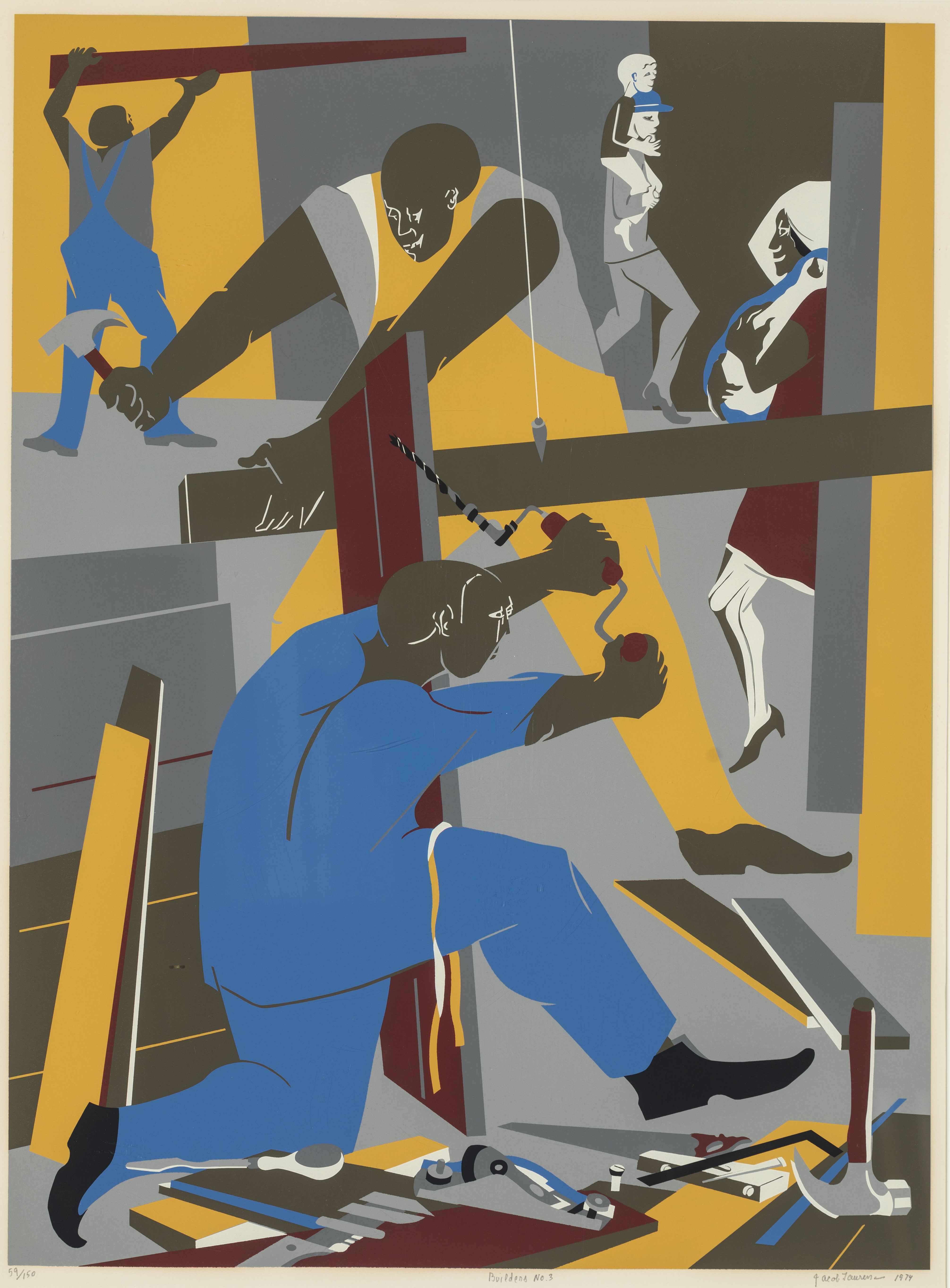
Jacob Lawrence (1917-2000), Serigraph print, 1974
Gift of Gilbert M. Frimet,
Collection of UM-Dearborn (1980.065)
Photographed by Tim Thayer
This powerful serigraph print from the permanent collection was created by Jacob Lawrence (1917-2000), one of this century's most widely acclaimed artists.
Lawrence was born in Atlantic City, New Jersey, but moved to Harlem, New York, at 13. He is among the few painters of his generation who grew up in a Black community, received instruction primarily from Black artists, and was influenced by the experiences of Black individuals.
Lawrence's artwork portrays the lives and struggles of the Black community, capturing their experiences through several series focused on figures such as Toussaint L'Ouverture, Frederick Douglass, and Harriet Tubman, as well as themes related to life in Harlem and the civil rights movement of the 1960s. His style is characterized by vibrant colors and abstract forms.
In the 1940s, during a time of widespread segregation, Lawrence broke racial barriers by becoming the first Black artist whose work was acquired by the Museum of Modern Art in New York City.
He stated, "If at times my productions do not express the conventionally beautiful, there is always an effort to express the universal beauty of man's continuous struggle to lift his social position and to add dimension to his spiritual being."
Researched and written by:
Julianna Collins, Stamelos Gallery Center former intern, UM-Dearborn art history/museum studies graduate, Class of 2025